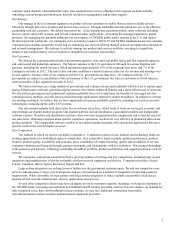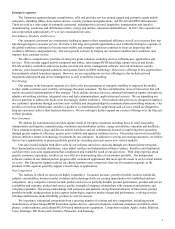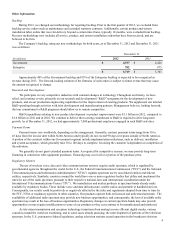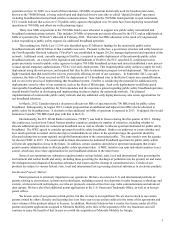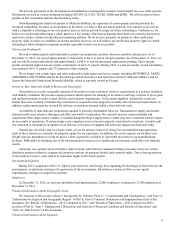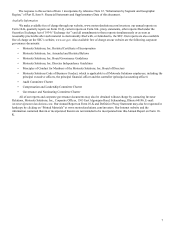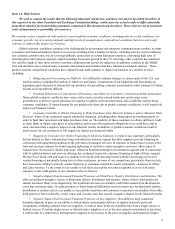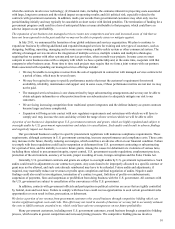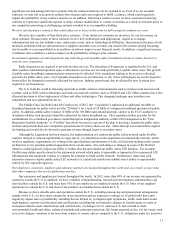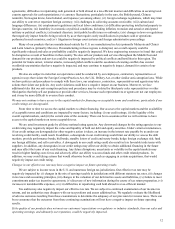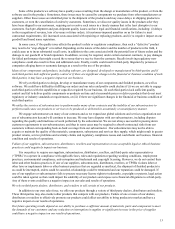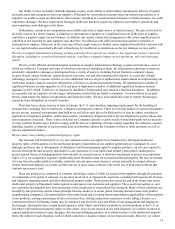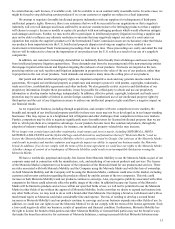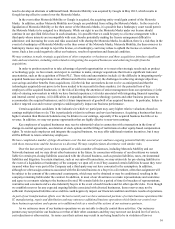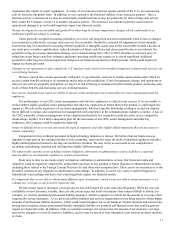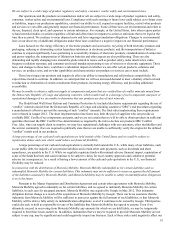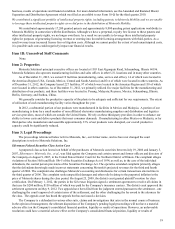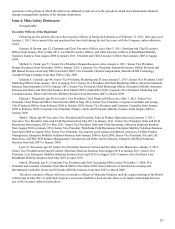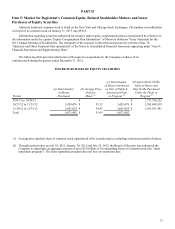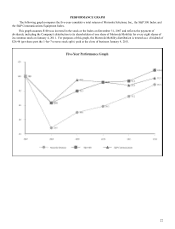Motorola 2012 Annual Report Download - page 20
Download and view the complete annual report
Please find page 20 of the 2012 Motorola annual report below. You can navigate through the pages in the report by either clicking on the pages listed below, or by using the keyword search tool below to find specific information within the annual report.12
agreements, difficulties in repatriating cash generated or held abroad in a tax-efficient manner and difficulties in securing local
country approvals for cash repatriations; (v) currency fluctuations, particularly in the euro, the British pound, Chinese
renminbi, Norwegian krone, Israeli shekel, and Japanese yen among others; (vi) foreign exchange regulations, which may limit
our ability to convert or repatriate foreign currency; (vii) challenges in collecting accounts receivable; (viii) cultural and
language differences; (ix) employment regulations and local labor conditions; (x) difficulties protecting intellectual property in
foreign countries; (xi) instability in economic or political conditions, including inflation, recession and actual or anticipated
military or political conflicts; (xii) natural disasters; (xiii) public health issues or outbreaks; (xiv) changes in laws or regulations
that negatively impact benefits being received by us or that require costly modifications in products sold or operations
performed in such countries; and (xv) litigation in foreign court systems and foreign administrative proceedings.
Many of our products that are manufactured outside the U.S. are manufactured in Asia (primarily Malaysia and China)
and Latin America (primarily Mexico). If manufacturing in these regions is disrupted, our overall capacity could be
significantly reduced and sales or profitability could be negatively impacted. We have engineering resources in Israel that could
be disrupted as a result of hostilities in that country. We also sell our products and services throughout the Middle East and
demand for our products and services could be negatively impacted by political conflicts and hostilities in this region. The
potential for future unrest, terrorist attacks, increased global conflicts and the escalation of existing conflicts has created
worldwide uncertainties that have negatively impacted, and may continue to negatively impact, demand for certain of our
products.
We also are subject to risks that our operations could be conducted by our employees, contractors, representatives or
agents in ways that violate the Foreign Corrupt Practices Act, the U.K. Bribery Act, or other similar anti-corruption laws. While
we have policies and procedures to comply with these laws, our employees, contractors, representatives and agents may take
actions that violate our policies. Any such violations could have a negative impact on our business. Moreover, we face
additional risks that our anti-corruption policies and procedures may be violated by third-party sales representatives or other
third-parties that help sell our products or provide other services, because such representatives or agents are not our employees
and it may be more difficult to oversee their conduct.
We may not continue to have access to the capital markets for financing on acceptable terms and conditions, particularly if our
credit ratings are downgraded.
From time to time we access the capital markets to obtain financing. Our access to the capital markets and the availability
of acceptable terms and conditions are impacted by many factors, including: (i) our credit ratings, (ii) the liquidity of the
overall capital markets, and (iii) the current state of the economy. There can be no assurances that we will continue to have
access to the capital markets on terms acceptable to us.
We are rated investment grade by all three national rating agencies. Any downward changes by the rating agencies to our
credit rating may negatively impact the value and liquidity of both our debt and equity securities. Under certain circumstances,
if our credit ratings are downgraded or other negative action is taken, an increase in the interest rate payable by us under our
revolving credit facility could result. In addition, a downgrade in our credit ratings could limit our ability to: access the debt
markets; provide performance bonds, bid bonds, standby letters of credit and surety bonds; hedge foreign exchange risk; fund
our foreign affiliates; and sell receivables. A downgrade in our credit rating could also result in less favorable trade terms with
suppliers. In addition, any downgrades in our credit ratings may affect our ability to obtain additional financing in the future
and may affect the terms of any such financing. Any future disruptions, uncertainty or volatility in the capital markets may
result in higher funding costs for us and adversely affect our ability to access funds and other credit related products. In
addition, we may avoid taking actions that would otherwise benefit us, such as engaging in certain acquisitions, that would
negatively impact our credit rating.
Changes in our effective tax rate may have a negative impact on future operating results.
We are subject to income taxes in the U.S. and numerous foreign tax jurisdictions. Our effective tax rate may be
negatively impacted by: (i) changes in the mix of earnings taxable in jurisdictions with different statutory tax rates, (ii) changes
in tax laws and accounting principles, (iii) changes in the valuation of our deferred tax assets and liabilities, (iv) failure to meet
commitments under tax incentive agreements, (v) discovery of new information during the course of tax return preparation, (vi)
increases in nondeductible expenses, or (vii) difficulties in repatriating cash held abroad in a tax-efficient manner.
Tax audits may also negatively impact our effective tax rate. We are subject to continued examination of our income tax
returns, and tax authorities may disagree with our tax positions and assess additional tax. We regularly evaluate the likelihood
of adverse outcomes resulting from these examinations to determine the adequacy of our provision for income taxes. There can
be no assurance that the outcomes from these continuing examinations will not have a negative impact on future operating
results.
If the quality of our products does not meet our customers' expectations or regulatory or industry standards, then our sales and
operating earnings, and ultimately our reputation, could be negatively impacted.


